

Inspecting education quality Lesson observation report. Five Essential Article Reads for Teachers. Below I’ve listed and briefly summarized five articles that, I believe, should be required reading for all teachers.
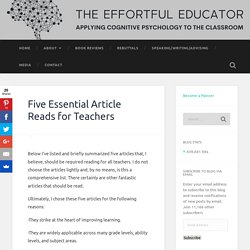
I do not choose the articles lightly and, by no means, is this a comprehensive list. There certainly are other fantastic articles that should be read. Ultimately, I chose these five articles for the following reasons: -They strike at the heart of improving learning. -They are widely applicable across many grade levels, ability levels, and subject areas. -They are easy reads.
-They are all open access. So, here goes…I hope you enjoy. Study Strategies to Boost Learning by Dr. Dr. Research Based Strategies That All Teachers Should Know by Dr. This article presents ten research based strategies and suggestions for classroom practice. The Case for Fully Guided Instruction by Dr. Re-thinking Observation and Feedback: Solving the learning problems. I’ve been doing a lot of thinking recently about the problems with standard observation and feedback processes and what a better approach might be.
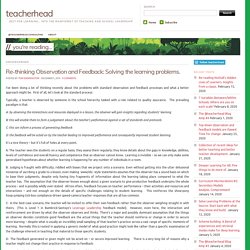
First of all, let’s look at the standard process: Typically, a teacher is observed by someone in the school hierarchy tasked with a role related to quality assurance. Re-thinking Observation and Feedback: Solving the learning problems. The five forms of feedback I give to teachers most often… In my work I have the privilege of being able to watch lots of teachers teach in a wide range of contexts. I see lots of superb teachers and lots of great lessons. What’s wrong with ‘pitch, pace and progression’? This morning Michael Chiles asked a question on twitter on whether it was sensible for an observer to make a judgement about the pace of a lesson: This reminded me of a consultant that I worked with as a young head of science back in the 90s whose mantra was that teaching was good when the pitch, pace and progression were all evident in a lesson. This wasn’t just the view of this consultant, but was very much viewed as the accepted wisdom back in the day – but it would seem that this view, like many bad ideas, has lingered and still exists.
What can we infer from an observation? This week, Ofsted published a paper describing their conclusions following a seminar in November 2017 in which they considered six models of lesson observation from around the world.
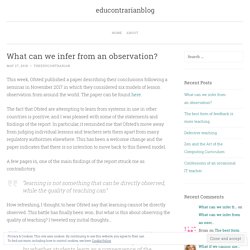
The paper can be found here. The fact that Ofsted are attempting to learn from systems in use in other countries is positive, and I was pleased with some of the statements and findings of the report. In particular, it reminded me that Ofsted’s move away from judging individual lessons and teachers sets them apart from many regulatory authorities elsewhere. 'It's not enough to simply ask teachers to collaborate – teamwork and trust need to be embedded into the heart of every school'
“Well, they behave fine for me...” are the words that no teacher wants to hear.
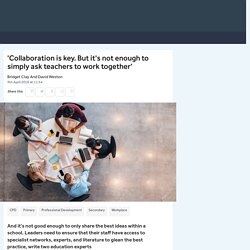
A smug colleague has an approach that is eluding you and is happier to offer smugness than help. Into the same bucket of sins, we can throw hoarders – the teachers who have files full of fabulous resources that they absolutely won’t let anyone else share – and hermits, who are rarely seen in the staffroom and manage to go for days barely speaking to colleagues. They say that it takes a village to raise a child, but teaching can sometimes feel quite the opposite of a collective endeavour. It’s remarkable how many people can work in schools full of hundreds of pupils and adults but feel completely isolated and alone.
Or how many schools share a town and a community but don’t share ideas and practice. To paraphrase US president Ronald Reagan’s memorable address to Soviet leader Mikhail Gorbachev, “We welcome change and openness. Teaching is far too hard to do alone. This much I know about…how research evidence stopped me judging individual lessons. I have been a teacher for 29 years, a Headteacher for 14 years and, at the age of 53, this much I know about how research evidence stopped me judging individual lessons.
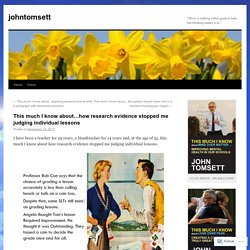
Becoming a school which bases its practice on a combination of common sense wisdom and what the evidence says works has been transformative, especially when it comes to lesson observations. Looking back over the years, the forces of external accountability drove me, at times, to do some stupid things. Built-in CPD. Our new model. This is the cover of our newly published CPD booklet that sets out our master plan for next year.
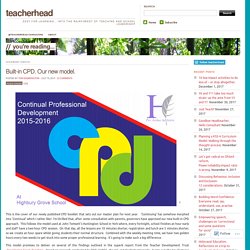
‘Continuing’ has somehow morphed into ‘Continual’ which I rather like! I’m thrilled that, after some consultation with parents, governors have approved our new built-in CPD approach. Teacher learning: it’s just learning – Improving Teaching. 12 Pointers Towards Great Teaching Assessment and Learning. Is your school getting professional development right? The biggest single factor that impacts on the quality of pupil learning experiences in our primary schools is the quality of teaching.
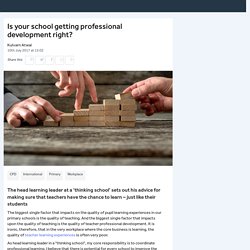
And the biggest single factor that impacts upon the quality of teaching is the quality of teacher professional development. It is ironic, therefore, that in the very workplace where the core business is learning, the quality of teacher learning experiences is often very poor. As head learning leader in a "thinking school", my core responsibility is to coordinate professional learning. I believe that there is potential for every school to improve the learning experiences of all staff. Getting to the heart of teacher led CPD. Over the last few years at Durrington we have developed a range of approaches to CPD – you can get an overview of them here and in my book ‘Perfect Teacher Led CPD’.
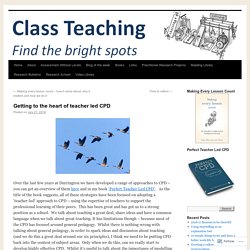
As the title of the book suggests, all of these strategies have been focused on adopting a ‘teacher-led’ approach to CPD – using the expertise of teachers to support the professional learning of their peers. This has been great and has got us to a strong position as a school. We talk about teaching a great deal, share ideas and have a common language when we talk about great teaching. My Observation Checklist.
The structure of our BlueSky lesson observation reports.
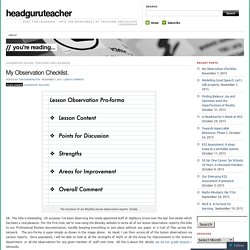
Simple. Ok. RSA Essays: Licensed to Create? Incentives for improving teacher quality. Today, the RSA has published a collection of 10 essays on the theme of improving teacher quality and the concept of licensing.
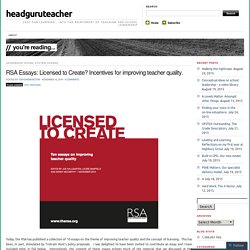
This has been, in part, stimulated by Tristram Hunt’s policy proposals. I was delighted to have been invited to contribute an essay and I have included mine in full below. Interestingly, the content of these essays echoes much of the material that we discussed at the Sutton-Gates Washington Summit, which is encouraging.
The full report can be accessed via the RSA website alongside a new animation created to accompany the report. Graded Lesson Observations: Alive and Kicking? Mention the phrase ‘graded lesson observations’ in any staffroom in the country and what would be the response? In many staffrooms they are derided as an ugly feature of a particular strain of virulent OFSTED-itus. Only three or four years ago ‘graded lesson observations’ were the norms in pretty much every school in the nation. Since then, with repeated confirmation from OFSTED, the practice is on the wane.
'Outstanding Teacher Programme' - Don't Believe the Hype. It is a truth universally acknowledged, if something sounds too good to be true it probably is. If a teacher training course promises a teacher can move from ‘good to outstanding‘ (let’s ignore the huge issue with those judgements for a moment) in a day – for a mere £500 – and over the course of ten lessons or so – it is likely exaggerating its benefits.
It may well be able to foster a few timely gimmicks (no doubt centred around the de rigueur OFSTED-related term: progress), but it will not change the core habits of a teacher, nor make them a truly great teacher over the longer term. It may promise long-term support, but it will inevitably focus on short-term ‘results’. I do that already. Teaching is a complex act. A culture of lesson observations by @adam_snell. Almost three months have now passed since Ofsted announced the ground-breaking news, that inspectors would no longer be grading individual lessons. Getting it right: The importance of observations by @TeacherToolkit (Part 1/2)
The Visible Classroom. Our schools are full of great teachers, but often the specifics of what they do to make great learning happen remain hidden. In his Visible Learning series of books, Professor John Hattie has argued that we need tools and research to make visible how the best teachers teach in order to support all teachers have the most positive impact possible on children’s learning. Scale: CPD, research, and getting the basics right. How would you like to be observed? by. As Ofsted continue to face yet more challenges over the validity of lesson observations, I discuss how best we can develop as teachers and ask the reader, ‘how would you like to be observed?’ Mrs P Teach: Very Late Thoughts on the Observation Game. Do you want to engage with research to become a better teacher/leader? Just taken the lead on research in our Teaching School Alliance. Talking about teaching in a world without lesson grades.
Images: @jasonramasami Teaching is a lonely profession. Outsiders rarely understand this. Hearts of darkness: another voice against graded observations. 10 tips for Tweeting Teachers by. Teacher Professional Development - IRIS Connect. Classroom observation: it’s harder than you think - CEM Blog - Centre for Evaluation and Monitoring. GoodCPDGuide Training, consultancy, INSET, and courses for teachers and education staff in schools and colleges. Excellence & Growth Schools Network. Events. National Teacher Enquiry Network. Lesson Observations. My thoughts. Fear/support. The primary head's blog. Beyond lesson observation grades? Archimedean leadership (1): What problems could leverage observation solve? Secret Teacher: schools have got lesson observations all wrong.
Professional Development for Quality Teaching.